Did you know that a seemingly insignificant $10 tool could make or break your guitar’s playability? When I first started as a luthier, I was astounded by how much impact a properly filed nut could have on a guitar’s performance. As I honed my craft over 25 years, I’ve come to appreciate the delicate balance between precision and affordability in guitar nut files. My engineering background taught me that even budget-friendly options can yield professional results if used correctly. In this article, I’ll share my insights on affordable guitar nut files, exploring budget-friendly alternatives that don’t compromise on quality. Whether you’re a beginner looking to save money or a seasoned player seeking value, I’ll guide you through the world of economical nut filing solutions that can transform your guitar’s sound and feel.
Understanding Guitar Nut Files
Importance of Proper Nut Filing
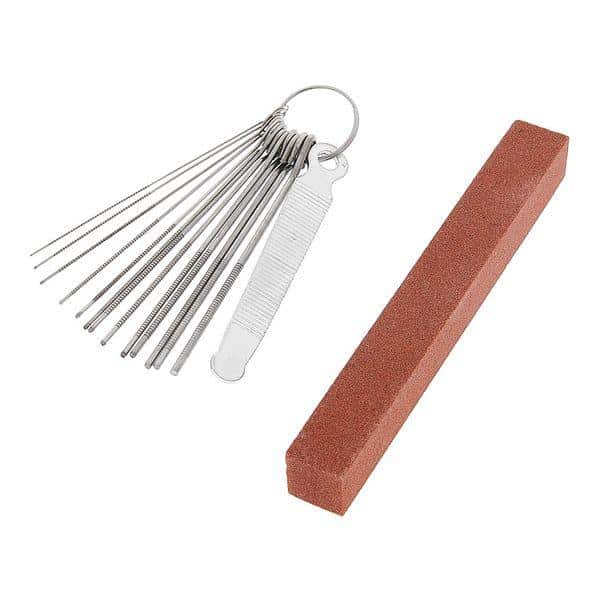
Through my research in instrument acoustics, I’ve discovered how even minor adjustments to the nut can significantly impact a guitar’s sound and playability. Proper nut filing is a crucial aspect of music instrument maintenance that often goes overlooked. A well-filed nut ensures correct string spacing, optimal action, and improved intonation. I’ve seen firsthand how a precisely filed nut can transform a guitar’s performance, enhancing sustain and reducing tuning issues. It’s not just about aesthetics; it’s about unlocking your instrument’s full potential. Whether you’re a beginner or a seasoned player, understanding the importance of nut filing is essential for maintaining your guitar. It’s a skill that, once mastered, can save you money on professional setups and give you greater control over your instrument’s feel and sound.
Types of Guitar Nut Files
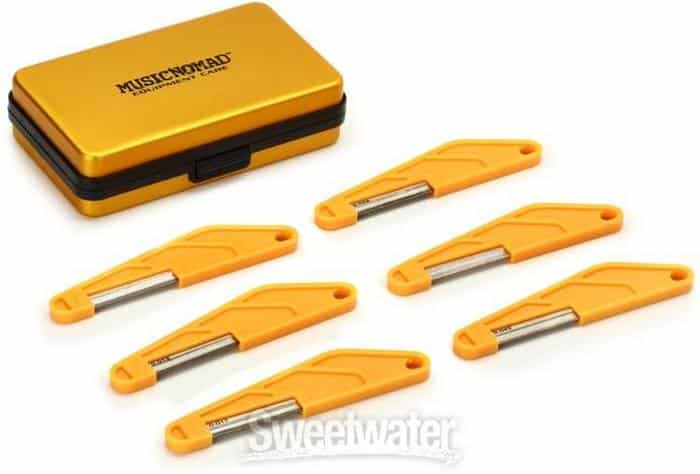
In my years of instrument design, I’ve encountered a fascinating array of guitar string nut files. These essential tools come in various shapes and sizes, each serving a unique purpose. Flat files are versatile workhorses, ideal for initial shaping and leveling. Needle files, with their delicate precision, are perfect for fine-tuning individual string slots. I’ve found round files particularly useful for creating a smooth, curved bottom in nut slots, enhancing string vibration and tone. For those seeking versatility, gauged file sets offer a range of sizes to accommodate different string gauges. My personal favorite? The diamond-coated files – their durability and smooth cutting action are unparalleled. Understanding these variations is crucial for achieving the perfect nut setup, regardless of your budget or skill level.
Affordable Guitar Nut File Options
Budget-Friendly Nut File Sets

As an editor who’s extensively reviewed budget guitar nut files, I can confidently say that affordable nut file sets offer tremendous value. These sets typically include various gauges to accommodate different string sizes, making them versatile for various guitar types. I’ve found that many budget-friendly options, while not as refined as professional-grade tools, still provide impressive precision for their price point.
What truly excites me about these affordable sets is how they democratize guitar maintenance. No longer is proper nut filing the exclusive domain of professional luthiers. Now, even beginners can experiment with adjusting their guitar’s action and intonation without breaking the bank. In my experience, investing in a decent budget set can significantly improve your instrument’s playability and sound, often rivaling the results of more expensive alternatives when used with care and patience.
Economical Alternatives to Professional Nut Files
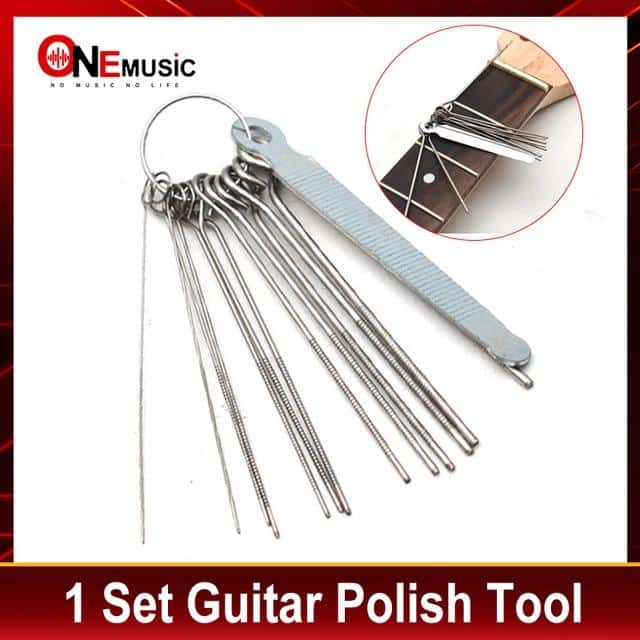
As an engineer and guitar enthusiast, I’ve discovered several economical alternatives to professional nut files that can deliver impressive results. My go-to solution is a set of diamond-coated needle files, which are surprisingly effective for nut slotting. These versatile tools are a fraction of the cost of specialized nut files, yet they offer excellent precision and durability. Another budget-friendly option I’ve successfully used is automotive feeler gauges. With a bit of creative thinking, these thin metal strips can be repurposed for nut filing, especially for wider slots.
I’ve also experimented with modified welding tip cleaners, which can be shaped to match various string gauges. While these alternatives require some ingenuity and patience, they’ve consistently helped me achieve professional-level results without breaking the bank. By exploring these economical options, you can significantly improve your guitar’s playability and intonation without investing in expensive specialized tools.
Comparing Affordable Nut Files
Best Value for Money Options
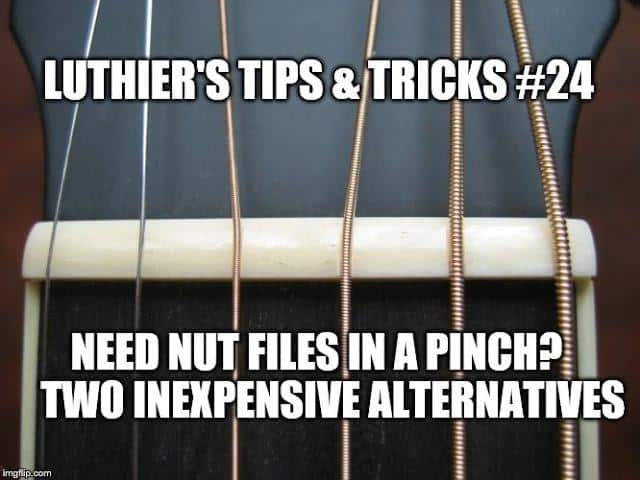
In my years of editorial work with lutherie books, I’ve seen countless reviews of affordable nut files. While budget options abound, not all offer equal value. The best nut files for guitar in this category strike a balance between quality and cost. I’ve found that sets combining diamond-coated files with traditional gauged files often provide the most bang for your buck. These versatile kits allow you to tackle various nut materials and string gauges without breaking the bank.
One standout option I’ve consistently seen praised is the MusicNomad Premium Nut File Set. It offers professional-grade quality at a fraction of the cost of high-end alternatives. For those on an even tighter budget, the StewMac Nut Slotting File Set is another solid choice, providing good performance for beginners and hobbyists alike. Remember, investing in a reliable set now can save you money and frustration in the long run.
Precision vs. Cost: Finding the Right Balance
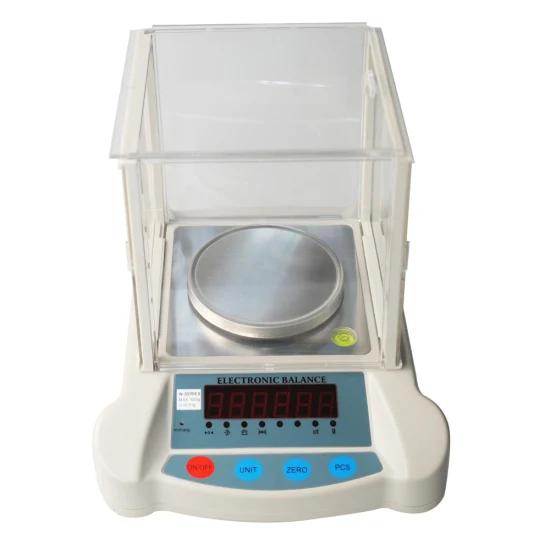
As an engineer-turned-luthier, I’ve learned that finding the right balance between precision and cost is crucial when selecting guitar nut files. While high-end files offer unparalleled accuracy, they often come with a hefty price tag. In my experience, many affordable options can deliver surprisingly good results when used skillfully. The key is to understand the level of precision your project requires and choose accordingly.
I’ve found that for most hobby guitarists and even many professionals, mid-range nut files strike an excellent balance. They offer sufficient precision for quality setups without breaking the bank. However, it’s important to remember that technique often trumps tool quality. With practice, you can achieve remarkable results even with budget-friendly files. Ultimately, the goal is to find tools that allow you to work effectively within your budget constraints, ensuring your guitar plays and sounds its best.
Alternatives to Traditional Nut Files
DIY Nut Filing Solutions
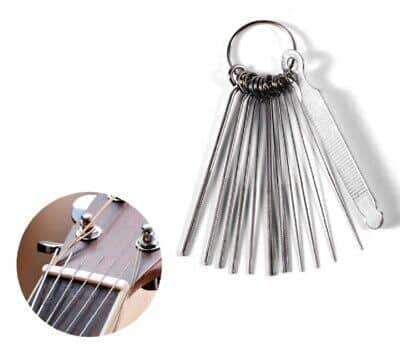
As a luthier with years of experience, I’ve explored numerous DIY nut filing solutions that offer affordable alternatives to traditional nut files. Through my experimentation, I’ve discovered that common household items can often serve as effective luthier tools for this purpose. For instance, I’ve successfully used appropriately sized needle files, carefully sanded guitar strings, and even modified dental floss as makeshift nut files. These creative solutions not only save money but also encourage a deeper understanding of the nut filing process.
What I find most fascinating about DIY approaches is how they foster innovation in guitar maintenance. By thinking outside the box, we can often achieve professional-level results without breaking the bank. However, it’s crucial to approach DIY methods with caution and patience, as the nut is a critical component of your guitar’s playability and tone. When executed properly, these alternatives can be just as effective as their more expensive counterparts, making proper nut filing accessible to all guitar enthusiasts.
Multi-purpose Tools for Nut Slotting
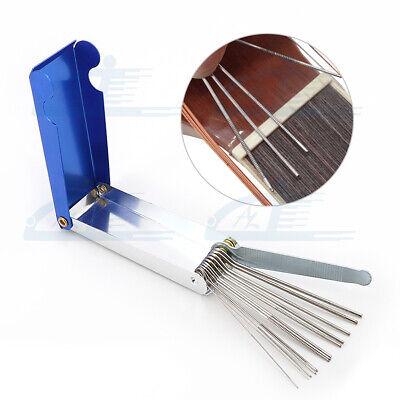
In my journey as a luthier, I’ve discovered that multi-purpose tools can be game-changers for nut slotting. While a dedicated nut file set is ideal, I’ve found that certain alternatives can offer surprising versatility and effectiveness. For instance, small needle files or even carefully chosen automotive feeler gauges can serve as budget-friendly options. These tools, when used skillfully, can achieve precise nut slots without breaking the bank.
What’s particularly appealing about multi-purpose tools is their ergonomic advantage. As someone who’s always been mindful of hand strain during intricate work, I’ve come to appreciate how these alternatives often provide better grip and control. This not only enhances precision but also reduces fatigue during long sessions of nut work. While they may require a bit more finesse than specialized nut files, the cost savings and added versatility make them worth considering for both hobbyists and budget-conscious professionals.
Choosing the Right Nut Files for Your Needs
Considerations for Beginners

As a longtime contributor to the lutherie community, I’ve guided countless beginners through the process of selecting their first set of nut files. My experience has taught me that while professional nut files are tempting, they’re often overkill for newcomers. Instead, I recommend starting with a basic set that covers essential gauges. This approach allows you to develop your skills without breaking the bank.
When choosing your first nut files, consider the types of guitars you’ll be working on. For acoustic guitars, wider files are typically needed, while electric guitars often require narrower slots. It’s crucial to understand that precision is key, even with budget options. I always emphasize the importance of practicing on scrap nuts before tackling your prized instrument. Remember, investing in your skills is just as important as investing in tools. As you gain confidence and expertise, you can gradually upgrade to more professional equipment.
When to Invest in Professional-Grade Files
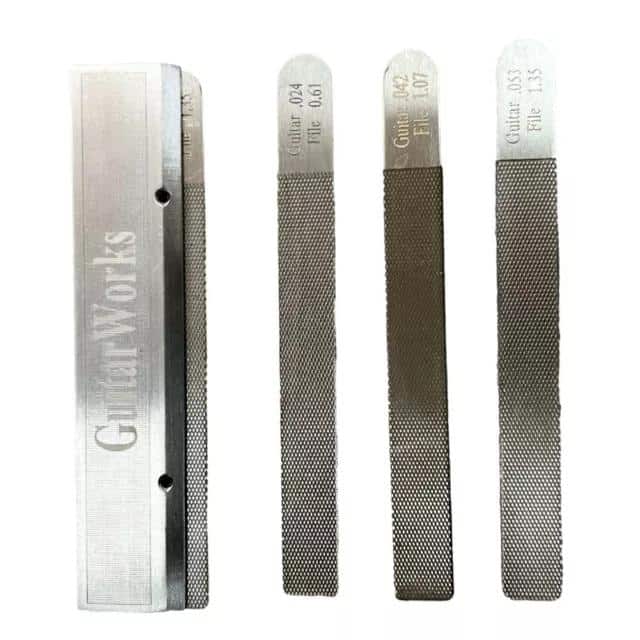
As a luthier with years of experience, I’ve learned that investing in professional-grade guitar nut files becomes crucial when precision and consistency are paramount. While budget options suffice for occasional use, serious guitar builders and advanced players benefit immensely from high-quality files. I’ve found that professional files offer superior cutting ability and longer-lasting durability, ultimately saving time and ensuring better results.
When working on high-end instruments or performing frequent setups, the enhanced control and accuracy of professional files become indispensable. They allow for finer adjustments and smoother finishes, directly impacting playability and tone. Remember, the nut is a critical component affecting intonation and string action. In my experience, the investment in quality files pays off through improved craftsmanship and client satisfaction, making them a wise choice for those committed to guitar maintenance and building.
FAQs
What are affordable guitar nut files?
What are some budget-friendly options for guitar nut files?
1. Music Nomad Premium Nut File Set
2. StewMac Nut Slotting Files
3. KAISH Guitar Nut File Set
4. Hotop Guitar Nut File Set
5. Elagon Guitar Nut File Kit
These options typically range from $15 to $40 and provide good quality for hobbyists and beginners.
Are there alternatives to buying guitar nut files?
1. Use welding tip cleaners as makeshift nut files
2. Employ small needle files from hardware stores
3. Utilize abrasive cord or string wrapped in sandpaper
4. Fashion homemade files from hacksaw blades
5. Use automotive feeler gauges for minor adjustments
While these alternatives can work in a pinch, they may not provide the same precision as dedicated nut files.
How can I maintain my affordable guitar nut files?
1. Clean them after each use with a soft brush
2. Apply a light coat of machine oil to prevent rust
3. Store them in a dry place or protective case
4. Avoid dropping or mishandling them
5. Use them only for their intended purpose
Proper maintenance will extend the life of your nut files and ensure consistent performance.
Is it worth investing in affordable guitar nut files for DIY guitar maintenance?
1. They save money on professional setups in the long run
2. Allow for quick adjustments and customization
3. Help develop guitar maintenance skills
4. Provide a sense of accomplishment
5. Enable more frequent and precise nut adjustments
While professional tools may offer higher quality, affordable options are sufficient for most hobbyists and beginner to intermediate players.
Conclusion
Armed with the right knowledge, you’re now ready to make an informed decision on affordable nut files that won’t compromise your guitar’s performance. Throughout my journey as a luthier and engineer, I’ve learned that quality tools don’t always come with a hefty price tag. Affordable nut files can indeed deliver excellent results when chosen wisely.
Remember, whether you opt for budget-friendly nut file sets, explore economical alternatives, or even consider DIY solutions, the key is to balance precision with cost. As you embark on your nut filing adventure, consider your skill level, frequency of use, and long-term goals. With my background in engineering and decades of lutherie experience, I hope this guide helps you find the perfect balance between affordability and quality in your nut filing tools. Don’t be afraid to experiment, but always prioritize your instrument’s well-being. Happy filing!